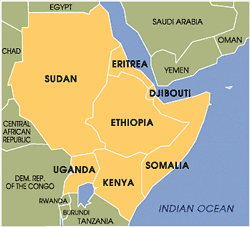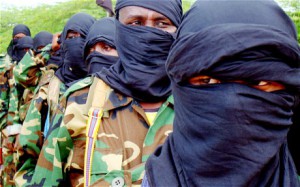redo Jump to...
print Print...
Note: This article is from the British newspaper The Daily Telegraph.
 (by Mike Pflanz, Telegraph.co.uk) NAIROBI – Israel has promised to help Kenya in its battle against Somalia’s Islamists and in the international fight against piracy off the Horn of Africa.
(by Mike Pflanz, Telegraph.co.uk) NAIROBI – Israel has promised to help Kenya in its battle against Somalia’s Islamists and in the international fight against piracy off the Horn of Africa.
Shimon Peres, the Israeli president, said his country is ready to “make everything available” to Kenya to secure its borders and boost its internal security as it continues its incursion into its [chaotic] neighbor [Kenya’s territory to fight al Shabaab].
Details of the deal were not immediately released.
Raila Odinga, Kenya’s prime minister, said that increasing internal security threats “called for more advanced and improved security measures.”
Kenyan forces swept across the border into Somalia six weeks ago, with the aim of routing al-Shabaab, Somalia’s al-Qaeda-linked Islamist insurgents.
“Israel can help Kenya police to build the capacity to be able to detect militants, know what kinds of arms they have and preempt and destroy the networks that recruit youths and kill inside the country,” Mr. Odinga said in a statement.
The recruitment of young men from Kenya to fight for al-Shabaab was also a threat that his government had to “deal with urgently,” he added.
Mr. Odinga, who is on an official visit to Jerusalem, also met with Benjamin Netanyahu, Israel’s prime minister, who echoed his president’s offers of support.
“Kenya’s enemies are Israel’s enemies so we should be able to help,” Mr. Netanyahu was quoted as saying after the meeting.
“We have similar forces planning to bring us down. I see it as an opportunity to strengthen our ties.”
Israel has in the past helped Kenya following al-Qaeda attacks on the US embassy in the capital, Nairobi, in 1998.
Four years later, al-Qaeda blew up a hotel on Kenya’s coast popular with Israeli tourists, killing 15 people, and tried to shoot down a holiday jet leaving Kenya for Tel Aviv.
The new agreement, announced on Monday, however risked further enraging al-Shabaab, Somalia’s jihadist insurgents, and was likely to temper [lessen] support for the Kenyans’ actions within Somalia, analysts warned.
“This move will give [al-Shabaab] room to push the perception that this is not just Kenya fighting for itself, but that it is a coalition of Christian or non-Muslims fighting against Muslims,” said Andrews Atta-Asamoah of the Institute for Security Studies in Nairobi.
Information appearing on telegraph.co.uk is the copyright of Telegraph Media Group Limited and must not be reproduced in any medium without licence. Reprinted here for educational purposes only. May not be reproduced on other websites without permission from the Telegraph. Visit the website at telegraph.co.uk.
Questions
1. Before answering the questions, read the “Background” below to gain a better understanding about al Shabaab.
How is Israel going to help Kenya?
2. What help does Kenya’s President Raila Odinga want Israel to provide?
3. Why is Israel helping Kenya?
4. What is al Shabaab?
5. Analysts warned that the new agreement between Kenya and Israel risked further enraging al-Shabaab, and was likely to lessen support for Kenyans within Somalia. “This move will give [al-Shabaab] room to push the perception that this is not just Kenya fighting for itself, but that it is a coalition of Christian or non-Muslims fighting against Muslims,” said Andrews Atta-Asamoah of the Institute for Security Studies in Nairobi. (NOTE: The majority of Kenyans [75-80%] are Christian; 99% of Somalis are Sunni Muslims.) Al Shabaab is a violent, dangerous threat to Kenya.
Should the government of Kenya refuse Israel’s help in defeating al-Shabaab because it might anger Somali citizens? Explain your answer.
Background
SOMALIA’S GOVERNMENT AND AL-SHABAAB: (The U.S. State Department has identified al-Shabaab as a terrorist organization.)
- Since the collapse of Somalia’s government in 1991, various groupings of Somali factions sought to control the national territory (or portions thereof) and fought small wars with one another.
- In 1997, the Organization of African Unity and the Intergovernmental Authority on Development (IGAD) gave Ethiopia the mandate to pursue Somali reconciliation. In 2000, Djibouti hosted a major reconciliation conference (the 13th such effort), which in August resulted in creation of the Transitional National Government in Somalia (TNG), whose 3-year mandate expired in August 2003.
- A Transitional Federal Government (TFG) was created in Somalia in 2004.
- In July 2006, Ethiopian forces invaded Somalia and defeated the Islamic Courts Union (ICU). In January 2009, Ethiopian forces completely withdrew from the country.
- U.S.-designated foreign terrorist organization al-Shabaab, formerly the military wing nominally under the ICU, became independent of the Islamic Courts Union and launched a multi-faction insurgency after the Courts scattered as a result of the 2006 invasion.
- Al-Shabaab and other extremist forces garnered power in subsequent years through their effective fighting of the Ethiopians, intimidation, and harsh implementation of shari’a law.
- Al-Shabaab forces controlled most of south-central Somalia and parts of Mogadishu, significantly hampering the TFG’s [Transitional Government’s] ability to provide public services as well as affecting the delivery of humanitarian aid to vulnerable Somali populations. (from state.gov/r/pa/ei/bgn/2863.htm#political)
- Al-Shabaab is an Islamist insurgent group fighting to overthrow the government of Somalia.
- As of summer 2010 the group is said to control most of the southern and central parts of Somalia, including “a large swath” of the capital, Mogadishu, where it is said to have imposed its own “harsh” form of Sharia law.
- The group describes itself as waging jihad against “enemies of Islam” and is engaged in combat against the Somali Transitional Federal Government (TFG) and African Union Mission to Somalia (AMISOM).
- It has reportedly “declared war on the U.N. and on Western non-governmental organizations” that distribute food aid in Somalia, killing 42 relief workers in the past two years of 2008 and 2009.
- It has been designated a terrorist organization by several western governments [including the American, Australian, Canadian and British] and security services [including Norwegian and Swedish], and described as having “ties to Al Qaeda,” which their leaders denied until early 2010.
- Because of its opinions and methods, Al-Shabaab, has been compared with the Taliban in Afghanistan and Pakistan. (from wikipedia)
Activities: Al-Shabaab has used intimidation and violence to undermine the Somali government, forcibly recruit new fighters, and kill activists working to bring about peace through political dialogue and reconciliation. The group has claimed responsibility for several high profile bombings and shootings throughout Somalia targeting African Union troops and TFG officials. It has been responsible for the assassination of numerous civil society figures, government officials, and journalists. Al-Shabaab fighters or those who have claimed allegiance to the group have conducted violent attacks and targeted assassinations against international aid workers and nongovernmental organizations. During 2010, al-Shabaab carried out multiple attacks, including a number in Mogadishu against the TFG and African Union Mission in Somalia. Among the most deadly were a series of attacks in March, which killed at least 60 people and wounded 160 more; and a string of attacks in late August, which killed at least 87 people and wounded 148. Also in August, al-Shabaab suicide bombers entered the Muna Hotel in Mogadishu and killed 31 people, including six members of parliament and four other government officials, when they detonated their explosives on the roof of the hotel. In the organization’s first attack outside of Somalia, al-Shabaab was responsible for the July 11 suicide bombings in Kampala, Uganda during the World Cup, which killed nearly 80 people, including one American citizen. In total, al-Shabaab is estimated to be responsible the death of over 900 people in 2010. (from the U.S. State Department’s “2010 Country Reports on Terrorism)
state.gov/s/ct/rls/crt/2010/170264.htm)
Resources
For a map of Africa, go to worldatlas.com.
For an interactive map of the Horn of Africa, go to cfr.org.
For background information on Kenya and Somalia, go to the U.S. State Department website at: state.gov/misc/list/index.htm and the CIA World FactBook.
Daily “Answers” emails are provided for Daily News Articles, Tuesday’s World Events and Friday’s News Quiz.




